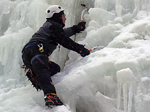Having said that, I don't believe that completing an Rx-ed Fran with a head-exploding time necessarily makes you a complete athlete (or an athlete for that matter). Translating those functional strength gains into athletic achievements does. For example:
- throwing a baseball from right field to home plate on one hop to save a run
- dunking over three taller defenders late in the game
- getting a first ascent climbing a steeply overhanging rock face
- throwing a devastating roundhouse kick for KO
- sprinting 100 meters faster than your opponents
Mark Twight -- a man whose gym I am not fit to sweep -- agrees with me.
We train in preparation for sport-specific tests or work-related challenges, we do not train for the sake of it or because conditioning is our sport or hobby. We don't do this because we want to look a certain way or to lose weight (these are consequences). We suffer during training to improve ourselves physically and psychologically and we measure those improvements on mountains, on frozen waterfalls, in burning buildings, facing cunning adversaries, on the battlefield, on the mat and in the cage. Because these tests occur outside the gym we don't compete in the gym, we work hard, and we work together to make the sum greater than its individual parts. Cheating here won't help us get where we are going so we enforce all quality all of the time.
That's our yardstick, how long is yours?
For many that train, this distinction is meaningless because they train to compete in sports. But let's also not minimize what they do because some dude can do a lot of pull-ups. And let's not forget that much of Crossfit comes from the best of what elite athletes were already doing, not the other way around.
* * *
In the above referenced article, Twight discusses quality versus quantity and how honor translates into true athletic gains. His discussion of Quality makes me examine how I train and how cheating myself is the cruelest deceit.

No comments:
Post a Comment